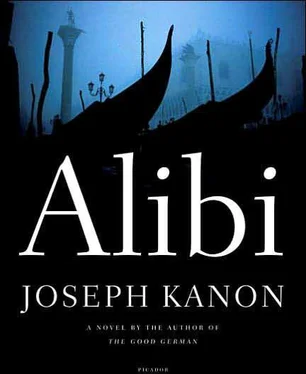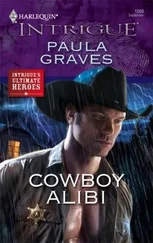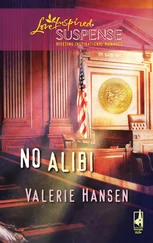Joseph Kanon - Alibi
Здесь есть возможность читать онлайн «Joseph Kanon - Alibi» весь текст электронной книги совершенно бесплатно (целиком полную версию без сокращений). В некоторых случаях можно слушать аудио, скачать через торрент в формате fb2 и присутствует краткое содержание. Жанр: Триллер, на английском языке. Описание произведения, (предисловие) а так же отзывы посетителей доступны на портале библиотеки ЛибКат.
- Название:Alibi
- Автор:
- Жанр:
- Год:неизвестен
- ISBN:нет данных
- Рейтинг книги:3 / 5. Голосов: 1
-
Избранное:Добавить в избранное
- Отзывы:
-
Ваша оценка:
- 60
- 1
- 2
- 3
- 4
- 5
Alibi: краткое содержание, описание и аннотация
Предлагаем к чтению аннотацию, описание, краткое содержание или предисловие (зависит от того, что написал сам автор книги «Alibi»). Если вы не нашли необходимую информацию о книге — напишите в комментариях, мы постараемся отыскать её.
Alibi — читать онлайн бесплатно полную книгу (весь текст) целиком
Ниже представлен текст книги, разбитый по страницам. Система сохранения места последней прочитанной страницы, позволяет с удобством читать онлайн бесплатно книгу «Alibi», без необходимости каждый раз заново искать на чём Вы остановились. Поставьте закладку, и сможете в любой момент перейти на страницу, на которой закончили чтение.
Интервал:
Закладка:
We were always together now, a kind of hiding, making love in her room, wanting each other even more because no one else was part of the secret, a new intimacy. Sometimes we went out for walks and talked about it, the only ones who knew, but mostly we stayed in, sex another way of talking, something else we could say only to each other. When she held me afterward, her fingers would move over my shoulder, making sure I was still there, and I would put my arm around her as if I were folding her up in a cape, making the world go away, both of us safe.
“No. We want them to see us.”
“How can I sit there? What will people think?”
“That you’re part of the family. Cavallini already thinks it. He thinks we’re Gianni’s family. Almost, anyway.”
“Ha.”
“He asked if his wife could call on my mother. Like something out of-”
“Yes,” she said impatiently, “very Venetian. The old manners. And you trust that?”
“You’re going for her sake. He’ll expect it. He’d notice if you didn’t.”
“My god. His family. Am I going crazy?”
I put my hands on her shoulders. “Just this, then we’ll go away.”
“Leave Venice?” She reached up, grabbing my arm. “You think they know something?”
I shook my head. “No, nothing.”
“Then why?”
“Because we’re the only ones who can give us away now-if we slip, say something. So the sooner we leave-”
She looked at me, silent for a minute. “Yes, the only ones,” she said finally. Then she turned away, out of my hands. “But first this. Am I supposed to cry too?”
“Just as long as Cavallini sees you with the family.”
But in fact there was some question about where to seat us. The ushers led my mother to the front, the widow’s pew, and then stopped short, placing us a few rows behind, on the right. My mother, dry-eyed behind her veil, seemed not to notice, still enveloped in that eerie calm that had settled in after Cavallini’s first visit. But someone must have told the ushers, decided on the protocol. It occurred to me then that I had no idea who had arranged the funeral, taken care of all the details that only seem to happen by themselves. A full mass at the Salute. A gondola banked in flowers. A reception at the Ca’ Maglione. All organized, down to where to seat the almost-widow.
I looked at the front pew. Just behind, Cavallini and his wife sat next to the priest from the ball, presumably a row of relatives. But in the front itself there was only an old woman leaning on a girl, who must be the daughter, finally arrived from Bologna. Or had she been here for days, ignoring us, going about her father’s business? I noticed then that the church was divided, the faces I recognized from Bertie’s on our side, Venetians on the other, my mother separated from the family by an aisle.
I stretched my neck, trying to see the daughter’s face, but she was looking straight ahead, to the high altar, where the priest had appeared with upraised hands. We stood, and the backs of the relatives now hid her from every angle. Music echoed through the vault under the dome as the pallbearers brought the casket forward. When we were sitting again, I felt Claudia rigid against me, staring at the coffin. I put my hand over hers and looked past the altar, hoping to draw her attention away. To the left was the sacristy with the Titian ceilings, but they were lost in the space, distant and dim, while the coffin sat right in front of us, inescapable. Down in the first row, the daughter had bowed her head.
The service took hours. I had never attended a mass in Venice-for me, the churches were poorly lit galleries-and the spectacle of it took me by surprise. Busy altar boys in white surplices, Latin chants and candlelight, hundreds of people answering in unison-the whole vast church seemed to be in movement, except the women on either side of me, Claudia still rigid, my mother simply quiet, looking vaguely at nothing in particular. At one point Cavallini turned his head slowly, as if he were counting the house, caught my eye and nodded, but otherwise we were left to ourselves. Nobody stared, more interested now in the theater of public grief. The eulogy, in Italian, was long enough to cover Gianni’s entire life. A choir sang. People streamed down the aisle for Communion.
Who were they all? Patients? Neighbors? There seemed, beyond the formalities, to be a genuine sadness in the room, or at least a somber reserve. What had he been to them? A friend? Or just someone with a doge in the family, respected out of long habit? Or maybe a dinner companion at Villa Raspelli, drinking the last of the good Soave. Don’t forget what he was. I looked down toward the daughter. Did she know? A law student, after all, not a child. But maybe he was still Papa, affectionate at home. People saw what they were supposed to see. Cavallini thought Gianni was rich, what any poor cousin would think, having even less. But the daughter’s grief was real enough. Her shoulders were moving now, shaking with discreet sobs, the only person in the great church actually crying. The old woman-an aunt? the nanny? — put an arm around her. I looked away.
Outside, there was confusion. People loitered on the steps, waiting for a cue. Were we supposed to follow out to San Michele? I remembered my father’s funeral, the long line of black cars, lights kept on, heading slowly toward Long Island. Here they would be gondolas, another ordinary ritual made fantastical by water. Or was the burial private, by invitation? Everyone looked at the daughter, climbing now into a gondola, away from the boat with the casket. Thin, her face still indistinct behind a veil, but perfectly erect, a girl from a good convent school. Her gondola headed up the canal toward Ca’ Maglione.
Cavallini came up to us and took my mother’s hand in a silent condolence, then nodded to Claudia, standing at her side-exactly what I’d wanted him to see.
“Is there a burial?” I asked, looking toward the hearse gondola.
“Yes, but not here. The country house. They’ll take him there, and then tomorrow the family-” He let the rest explain itself. “Today, it’s for Venice.”
“The country house?”
“Yes, on the Brenta. It’s very well known. For the Giorgiones.”
“Oh,” I said, surprised. “He never mentioned it.”
“Yes, he did, darling,” my mother said, her voice flat. “You just didn’t listen.” She had turned to Cavallini. “Thank you so much. You’ve been kind again.” About what?
“They were not, you know, evidence. And of course Giulia agreed.”
“After you asked.”
“No, no, she agreed. She has them for you.” He looked at me. “Photographs. Of sentimental value, for your mother.”
Not evidence. But something he’d looked over, going through Gianni’s things, already on the case.
“Grace.” A gloved hand appeared out of nowhere, along with Celia de Betancourt’s eager voice. “How awful for you.” She nodded toward the logjam of boats at the bottom of the stairs. “You’re not going back to the house?” she said, somehow making it ordinary, a dusty ranch, not a palazzo on the Grand Canal.
“Yes. His daughter’s there.”
“You don’t mind if I take a rain check, do you? All this.” She waved her hand to the church behind us. “I feel done in.” She paused, catching up. “His daughter. You’ve made up?”
“There’s nothing to make up. She’s been at school.”
“That’s not what Bertie says. He says she-”
I looked up, curious, but my mother was patting her hand, stopping her.
“Celia, I can’t. Not today.” She looked down. “Not today.”
“Oh, sugar,” Celia said, distressed. “This mouth. I don’t mean anything by it. You know I wouldn’t-”
Читать дальшеИнтервал:
Закладка:
Похожие книги на «Alibi»
Представляем Вашему вниманию похожие книги на «Alibi» списком для выбора. Мы отобрали схожую по названию и смыслу литературу в надежде предоставить читателям больше вариантов отыскать новые, интересные, ещё непрочитанные произведения.
Обсуждение, отзывы о книге «Alibi» и просто собственные мнения читателей. Оставьте ваши комментарии, напишите, что Вы думаете о произведении, его смысле или главных героях. Укажите что конкретно понравилось, а что нет, и почему Вы так считаете.












